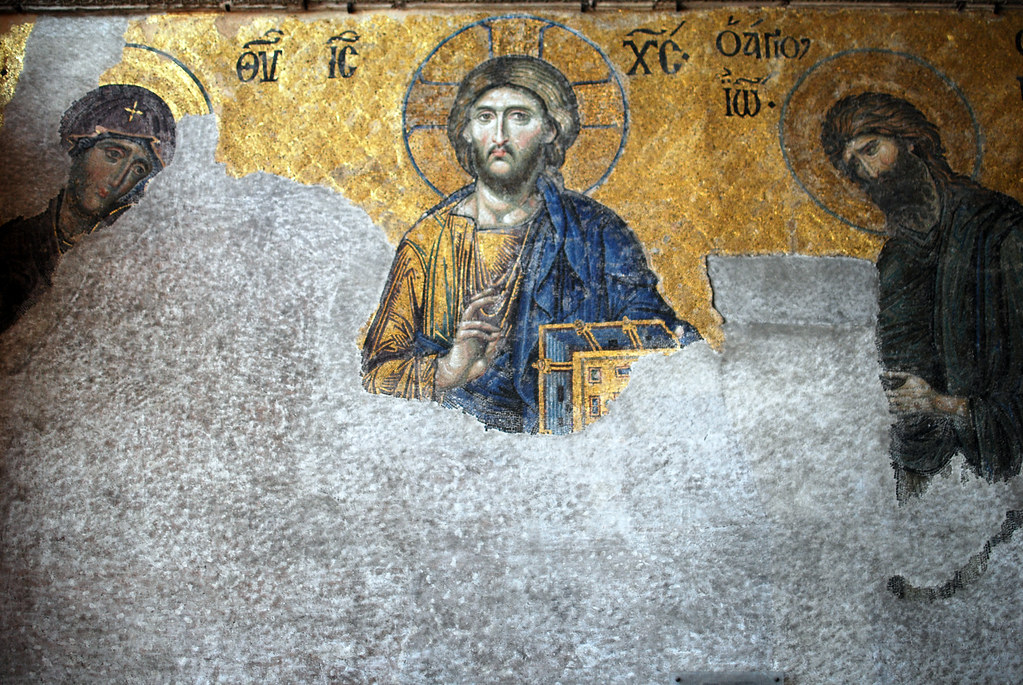
In the Year of Faith it is worth realising that "Faith" has at least two meanings.
The first, is seeing faith as a simple binding force, hence old Liberals underline their "Faith" commitment by telling us they were an ex-nun/priest/seminarian, where they studied theology or Church music and about their Irish/Polish/Hungarian granny's faith. Faith here is distinct from what they actually believe, it is a phenomena, it is something objective, with an ethos, which may or may not have moral consequences. It is a set of beliefs or a system of belief built on a series of "myths", to which in part, and on a certain level there is a degree of assent. It is uncomfortable with the supernatural and the miraculous.
The second is about trust, the type of faith that saves. Having faith in God means that we accept God intervenes in our lives, and that we are dependant on him. In this sense faith is beyond reason and against reason. It is the submission of the mind and heart to something beyond our comprehension, it having our heart resting in the supernatural.
In the first sense of Faith a priest can hold up the Sacred Host, and indeed affirm everything St Thomas has said about the Real Presence but fail to be moved by the awesome mystery he holds in his hands, or fail to expect that God will intervene in his life and the lives of those who receive him. In short, he might preach about the Real Presence but will have difficulty in falling on his knees to adore before the tabernacle.
Faith as presented in the scriptures, the faith of the Gospels and Epistles is life changing, it expects God to intervene. Ultimately it is about miracles, it is not necessarily rational on the contrary it begins in the irrational.. In fact although held by rational beings it begins by "trust". When a number of Jesus' disciples find his discourse on the Bread of Life impossible to take, Jesus asks the twelve whether they will go away as well, Peter seems to convey they have difficulties too, but responds, "Lord to whom shall we go to, you have the message of Eternal Life". Peter doesn't understand, he simply trusts, he actually believes and trusts in the person of Jesus before he believes the propositions Jesus puts forward, or rather it is belief in him that is foundation for belief in the propositions he puts forward. Though faith always seeks to understand and must understand, it always start by an act of submission, this is true even of modern "faiths" or religions such as Atheism, which starts from the faith premise that there is no God or god, or Scientificism, which believes science has all the answers, scientific theories are just that, "theories", to which a consensus gives credence. Both Atheism and Scientificism depend on something irrational and unprovable, therefore a positive act of faith.
There is an interesting report on religious education by Nigel Fancourt in which he says:
... that a lesson on Jesus feeding the 5,000 could become an exhortation to share your picnic rather than a discussion of whether miracles really happen or what significance they have for Christians today: for example those who say they have been miraculously healed or pray for healing”.The first kind of faith looks at the consequences of "faith", in a rational way but does not want to look at the first cause, at the direct intervention of God, hence we can have a Department of Catholic Studies at Roehampton which really has nothing to do with building faith, just simply trying to understan it. During the Year for Priests most bishops encouraged their clergy to reflect on various documents on Priesthood, the wise Bishop of Shrewsbury brought the Cure d'Ars heart to his diocese. The first approach touched the mind and the rational, the second touched the heart and really was irrational, the first was looking at faith the second engaging in faith. I was quite struck by the reaction of Bishop Hollis, who without meaning to criticise him, spent most of his episcopate making Catholicism reasonable and intelligible but was overwhelmed by the visit of the relics of St Therese to his Cathedral, it was pieces of bone not reason that had such a profound effect on him and in his diocese. It was faith not reason that filled his cathedral throughout the night.
During the Year of Faith we can study the various documents of Vatican II and the Catechism which will increase our knowledge of the Church's teaching and our understanding of the Faith but it will not necessarily increase our faith. It is living by faith that increases faith: acts of trust in the supernatiural, prayer, intercession, trusting in the miraculous. We can children about Jesus and that increases their knowledge but it is when we teach them to pray and worship that they begin to grow in faith.
A friend summarised the Gospel of John by saying, "the disciples need their faith increasing so Jesus works another miracle". John's "signs and wonders" are indeed Jesus' way of increasing faith, they point to another level being, which super-natural. In order to engage unbelievers, we need to introduce them to our world which is above or beyond nature, reason alone does nothing for unbelievers.






0 comments:
Post a Comment